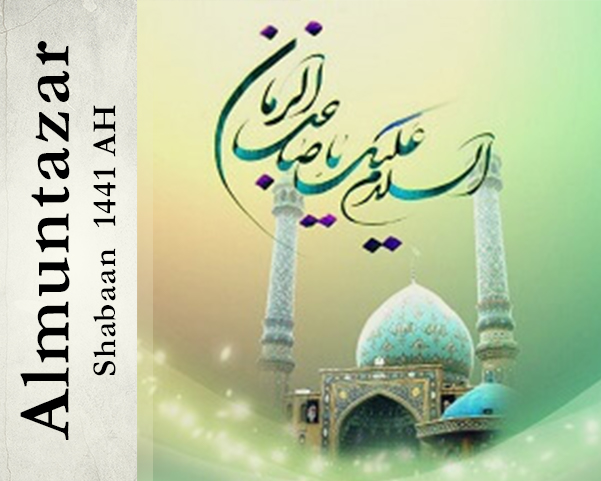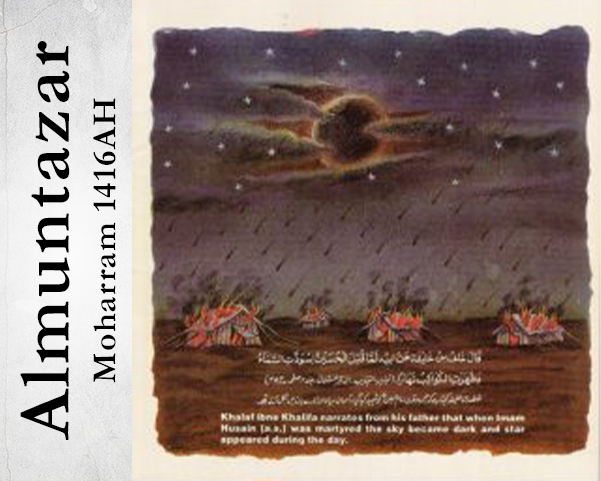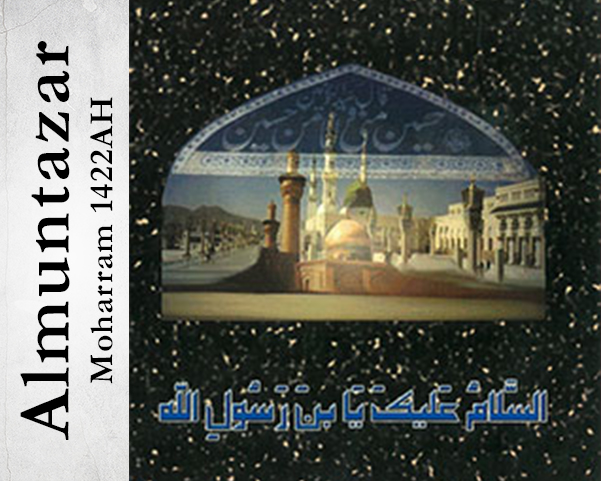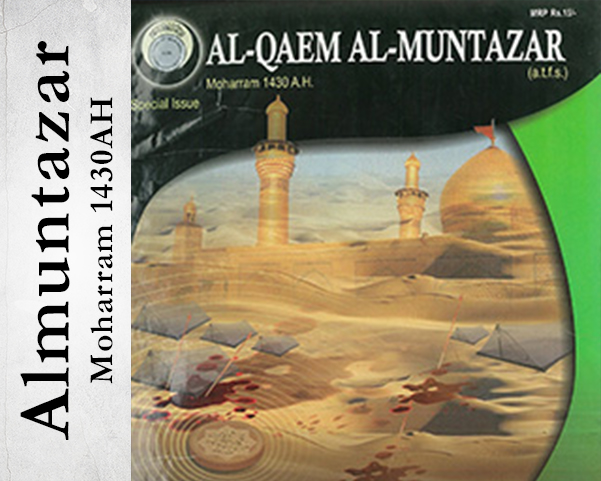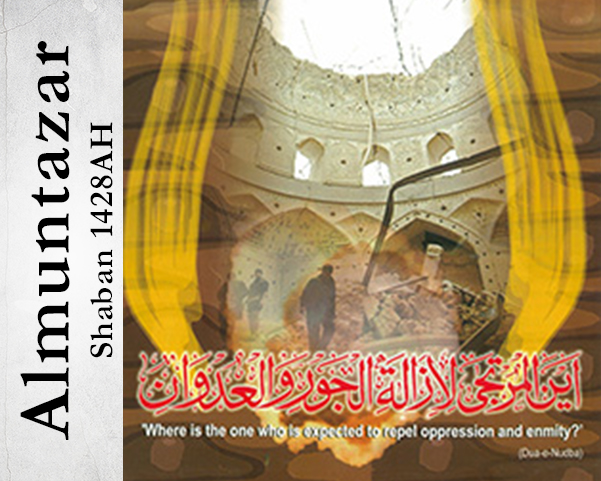To speak about Hazrat Fatema Zahra (Allah’s Salutation be on her, and her parents, and her husband, and on her progeny) is beyond our ability. Janabe Fatema (a.s.) is called Fatema because nobody can fathom her position. The only way to understand her august position is from the sayings of the Holy Infallibles (a.s.). A point to be noted here is that Holy Imams (a.s.) spoke to the people according to their level of intellect. Thus, our discussions in following paragraphs are only the glimpses of the esteem position of Janabe Zahra (s.a.).
The following are some of the quotations from the books of Ahle Sunnah describing the virtues and position of Janabe Zahra (s.a.).
1) Cause of creation of the Universe:
Numerous narrators of Ahle Sunnah, such as Shaikul Islam Hamuveni quotes in his book “Faradalus Semta’een, Book-1, page 36, from Ibne Abbas, who quotes from Holy Prophet (s.a.w.a.) that “When Allah created Hazrat Adam (a.s.) and Angels prostrated before him, then Hazrat Adam (a.s.) petitioned to Allah asking him whether He has created any one, who is more dear to him. Allah replied, Yes.
If they were not there, I would not have created you. Then Hazrat Adam (a.s.) expressed his desire to see them. At that time, Allah ordered the Angels to set aside the curtain. Then Hazrat Adam (a.s.) saw five shadows in front of the Throne of Allah. He (Adam) then asked “O’ Allah! Who are they? Then Allah said that ‘This is Prophet Mohammad (s.a.w.a.), this is a his cousin brother and successor, Ameerul Momeneen Ali (a.s.), and this is Fatema (s.a.) the beloved daughter of My Messenger, and these are the sons of Ali and the Prophet, Hasan and Husain. Listen O’ Adam, they are among your sons.
Khwarazmi has quoted in his book “Manaqib, that “Abu Hurrira, has invited attention especially to this sentence “If they would not have been there” you would not have been created. After this, Allah had said, if they would not have been there, even ‘Arsh’ and ‘Kursi’, Sky and Earth, Angels, Jinns and human beings too would not have been created. And for this reason Hazrat Fatema Zahra (s.a.) is the cause of Creation.
2) Love of Fatema, Condition of Prophethood:
Allah, All Praise and Honor Be to Him, has presented the mastership of Ali, Fatema and their infallible progeny before the creation. Those who took precedence in accepting them, they have been made Prophets. And those who have accepted them after the Prophets, Allah has considered them Shiah. And Allah will gather all of them in the Paradise. Many traditions in this behalf are there in the Book tilted as Basa’eru-Darjaat.
3) Grand Lady of this World and the Hereafter:
Ibn Mughazali Shafaiee, in his book “Manaqib”, page 399, has quoted this tradition from Holy Prophet (s.a.w.a.) that the Prophet (s.a.w.a.) had said “By the Almighty, who had made me a Prophet, that you O’ (Fatema (a.s.)) are the Leader of all Women in the both the worlds i.e. in this world, and the hereafter”. Many more traditions of this kind have been mentioned by Allama Shahabuddin Alusi in “Tafseerul Ma’ani”, Book 3, page 155. Shafaiee has quoted in “Sira’ee Halbie” Book 2, page 6, and many narrators of Ahle Sunnah thereafter, have also quoted many similar traditions to this effect. The names of few of them are: Suyuti, Muqrezi, Manavi, Ibn Abi Al Hadeed Moatazali, Ahmed Zaini Vehlaan, Shafaiee Mufti Misri.
4) Affection and regard for Fatema will serve at 100 places:
Allama Hamuveni, in his valuable book “Faradaius Simta’een”, Book 2, page 67 has stated a tradition from the Great Messenger (s.a.w.a.) that he said to Salmaan that “He who befriends Fatema (a.s.), he would be with me in the Paradise and he who bores enmity towards Fatema, would go to Hell. O! Salmaan Love of Fatema would serve or would come to rescue at 100 places. Out of these, the few that are least difficult are: Death, Grave, Scales, Day of Rising, Bridge of Seraat and Accountability. He with whom my daughter would be pleased, I will also be pleased with him, and with whom, I am pleased, Allah will also be pleased with him. And he, with whom Fatema would be angry, I will be angry with him, and when I will be angry, Allah will also be angry. Most deplorable is he who tyrannizes Fatema (a.s.) or her husband Ameerul Momeneen or any of her sons or any Shiah.” Is not this tradition enough for opening the eyes of the hearts
5) Way to earn the distinction to be with Holy Prophet (s.a.w.a.) in Paradise:
Allama Ibn Mughazali, in “Manaqib”, page – 37 states from Nasr Bin Ali and he on the authority of Imam Musa Kazim (a.s.), and he on the authority of his forefathers, and they, on the authority of Ameerul Momeneen (a.s.), quotes that the Prophet (s.a.w.a.) holding the hands of Hasan and Husain (a.s.) had said, “He, who befriends these two, their father and their mother, he would be in the same class as mine in the Paradise.”
Khatib Baghdadi had stated that when Nasr Bin Ali, stated this tradition, Mutawakkil ordered a punishment of two lashes. When the agents of Mutawakkil were beating him, Jafar Bin Abdul Wahid told Mutawakkil, that what is he doing, that man is a Sunni. He was then let off. (Tareeq Baghdad, Book 13, page 288)
6) Janabe Fatema (s.a.), Selected by Allah:
Highly respected Hanafi learned man, Khwarazmi, in his book titled “Maqtalul Husain”, Page 67, has quoted this tradition on the authority of Zaid Bin Ali, who on the authority of his forefathers, and they, on the authority of Ameerul Momeneen, had stated that “Hazrat Mohammad (s.a.w.a.) said to Fatema (a.s.), that “Allah after viewing all the humans on earth had selected your father and made him a prophet; again Allah viewed the would and selected your husband, that is my brother as my Successor. Then for the third time, when He (Allah) viewed the entire Universe, selected you and your mother and appointed both of you the Leaders of all the womenfolk. Allah, then for the fourth time, after having the view of the Universe, has selected both of your sons, conferred upon them the honor of being the Leaders of the Youths of Paradise.”
This type of tradition has been quoted by Hafiz Aasimi in his book “Zainiul Fatah”.
7) Hazrat Zahra (a.s.), first creation of Allah:
Allama Asqalani, in “Lisaamul Mizaan”, Book 3, page 349, has mentioned on the authority of Hazrat Imam Hasan Askari (a.s.) and he on the authority of his forefathers, and they on the authority of Imam Mohammad Baqer (a.s.), and he, on the authority of Jabir Bin Abdullah Ansari, quotes that “When Allah created Adam and Hawwa, they started taking pride in being more beautiful than others. In the meanwhile, they sighted another woman, whose face was extremely beautiful and luminous. It was difficult for them behold their sight from her radiance. Adam and Hawwa than prayed to Allah to know “Who is this Woman?” Then, Allah revealed: “This is Fatema (s.a.), who is the most superior woman of all in your progeny”. Then Adam, prayed saying that “O Allah! How it is that she is wearing a Crown” Then Allah replied “That is her husband Ali (a.s.)”. Then he asked “What are those two Earrings” Then Allah replied that “Those are her two sons.”
8) The Prophet and Fatema, two Pillars of Ali (a.s.):
Highly respected Theologian, Mohiuddin Tabari, in his book titled “Zakhair-e-Uqbah”, page 56, quotes from Hazrat Mohammad (s.a.w.a.), that the Prophet (s.a.w.a.) addressed Ali (a.s.), wishing him by the title of “O Father of two Fresh and Blossoming Flowers”, and said shortly, your two pillars will go.
When Holy Prophet (s.a.w.a.) died, Hazrat Ali (a.s.) said that out of the two pillars, this was one. And when shortly thereafter Hazrat Fatema (a.s.) died, he said this was the second pillar. Whatever meanings one may take of the word pillar, he could derive the same meanings and they apply to Fatema. Is there any other greater honor than this of being with the Prophet, and working with him shoulder to shoulder, and that of filling his place, after his demise.
9) Paradise on Salutation:
Allamah Ibn Mughazali Shafaiee in his book “Manaqib” page 363, had stated this tradition on the authority of Yazid Abdul Malik who stated on the authority of his grandfather, that “When he went to Fatema she took initiative in Saluting me, and had said ‘That when her father (Prophet) was alive, he used to say that whosoever sends his salaams to him (Prophet) and to me, continuously for three days, he will earn Paradise”. Then the narrator asked that” Is it during your lifetime” “She (Fatema) said: Be it in lifetime or after that, it makes no difference.”
It is to be noted that by wishing only, a staunch Muslim can go to paradise. This tradition shows what a high place and importance Hazrat Zahra (a.s.) commands.
10) Fatema (a.s.), the proof of Allah:
The renowned theologian and commentator of Ahle Sunnah, Hafiz Haskani in his book, “Shawahidul Tanzeel”, Book 1, page 58 had quoted this tradition through Janabe Jabir, and he from Holy Prophet (s.a.w.a.) that: “Of course, The Allah has appointed Hazrat Ali (a.s.), and his wife (Fatema (a.s.)) and her two sons as his residents over those who have been created. These persons are the “Door of Knowledge”. Whosoever, would take guidance from them, he would be treading on right path”. Through this tradition it becomes clear that Janabe Fatema (a.s.) was also the proof of Allah, and a Door to Knowledge.
11) Fatema (a.s.), the Spirit of Prophet:
Allama Siblinji, in his book, “Nurul Absaar, page 5, quotes from the great commentator and theologian, Mujahid who had said that “The Prophet, emerged taking the hands of Hazrat Fatema (a.s.) in hands and had said that, “One who knows this daughter, he knows it already, and he, who does not know her, should know that this is Mohammad’s, daughter, Fatema. She is a part of my self. She is my heart and my Spirit that lay between my two sides. Whoever harms her, he has actually harmed me, and he who harms me has harmed Allah.” Similar traditions in various styles have been quoted in the Books of Ahle Sunnah. From this, it becomes apparent that Hazrat Fatema (a.s.) was the part of the Prophet (s.a.w.a.). She shares the existence and honor of the Prophet. For this reason she also shares his glory.
12) Blessings of the Prophets – Mediation of Fatema:
Janabe Ibne Abbas inquired from the Prophet (s.a.w.a.) as to what were those words that were gifted to Janabe Adam, on the basis of which Allah had accepted his repentance. The Prophet (s.a.w.a.) replied “That Janabe Adam had supplicated to Allah with the names of Mohammad, Ali, Fatema, Hasan and Husain. (Hafiz Jalaluddin Suyuti, Al Dur-rul-Mansoor, Book 1, page 147)
13) Love for Hazrat Fatema (a.s.), a proof for being born clean:
A tradition from the first Caliph says that “I saw Mohammad (s.a.w.a.) sitting in a tent using a bow as pillow and there Ali, Fatema, Hasan and Husain were sitting. The Prophet said “O Muslims, those who are in good terms with the persons of the tent, I am in good term with them and those who on war terms, with them I am at war them Whoever befriends them, I am his friend. He, who was born to a pious mother, only can love them. Of course, who is ill-fated and not of pure birth would not maintain friendship with them.”
These type of traditions have come from others, apart from the first Caliph. (Hafiz Mohibuddin Tabri, “Prazul Nasra).
14) Janabe Fatema (a.s.), first to go to Paradise:
The Holy Prophet (s.a.w.a.) has said “The first one to enter in Paradise would be Fatema binte Mohammad (s.a.w.a.).” In another tradition, it is stated that the Prophet had said to Hazrat Ali (a.s.) that We i.e. I you, Fatema, Hasan and Husain, would be first to enter into Paradise.” Then Hazrat Ali (a.s.), asked (the Prophet), “and what about those who love us” The Prophet replied they would follow after him to Paradise. (Hafiz Jalaludin Suyuti).
15) Hazrat Zahra (a.s.) the chaste and Infallible:
About the chastity of Hazrat Fatema Zahra (a.s.), there are many references in Quran and traditions, the most prominent among all is Verse-e-Tatheer. This verse and other traditions are about the five Infallibles i.e. Hazrat Mohammad (s.a.w.a.), Hazrat Ali (a.s.), Janabe Fatema (a.s.) and Imam Hasan and Husain (a.s.).
This tradition was quoted by 30 companions of Holy Prophet (s.a.w.a.). Among these, the names of Janabe Umme Salma, wife of the Prophet, Anas Bin Malik, Vasla Bin Asqah are prominent. This tradition has been quoted in 20 ways by Umme Salma, in 9 ways by Anas Bin Malik and in 14 ways by Vasla. Hafiz Haskani alone has mentioned 130 traditions in connection of this Verse in his famous book “Shawahidul Tanzeel”. This Verse was revealed, only in favor of the five infallibles. There is no doubt that this Verse pertains only to Ahle Bait, and no other. When Holy Prophet (s.a.w.a.), did not permit his highly praised wife, Umme Salma (a.s.), who had sought permission to come under it, then the question of others does not arise.
This Verse clearly shows that Hazrat Zahra (a.s.) was free from all sorts of impurities and uncleanliness and was away and free from all sins thus leaving no doubt about this matter. She was even free from all monthly filth and also that of birth, as is generally the case with all women. For this reason the need to be cleaned after giving births does not arise in her case. On the other hand, Holy Prophet (s.a.w.a.) immediately used to take the new born in his arms. Further, this was the reason that the doors of everybody facing the mosque were ordered to remain close, except the door of Fatema (a.s.).
The Imam of Hanbali Sect, Ahmed Bin Hanbal, in “Musnad”, page 461, has quoted on the authority of Umme Salma about the events of the last days of Hazrat Fatema (a.s.) “That she took a bath, wore a new dress laid down in the middle of the room facing Qibla. Her hand was beneath her head. Then she said that shortly, she will be going from this world. I have cleaned my dress therefore, nobody should take it out.
Yes, Janabe Zahra (a.s.), was pure and virtuous, she did not need a ceremonial bath. On touching her dead body, does not require a bath. After death whatever dress comes into contact with her body does not get impure. Yes, all the revered Ahle Bait are similar.
16) Hazrat Fatema Zahra (a.s.) was a Muhaddisa:
Muhaddis or Muhiddisa, although not being a Prophet; could maintain (Liaison) with Angels and could talk to them. This could be best illustrated by the example of Janabe Maryam, Janabe Sara, wife of Ibrahim (a.s.) and also the mother of Musa. The Holy Quran had referred to them as being “Muhaddisa” in Surah Hud, Verse 71-73, Surah Qasas, Verse 7 and Surah Taha, Verse39.
This is a decided fact that Fatema Zahra (a.s.) is the most venerable of all. In many traditions of Holy Prophet (s.a.w.a.).he had conferred on Hazrat Zahra (a.s.), the title of Syedatul Nisail Aalameen (Leader of the all women of the universe). If Janabe Maryam and Janabe Sara could be Muhaddisa, there remains no doubt of Hazrat Fatema, being a Muhaddisa.
A tradition from Hazrat Jafar Sadiq (a.s.) says that Janabe Zahra (a.s.) was called Muhaddisa, because Angels used to come to her, and talk to her, in the same way as they used to speak with Janabe Maryam (s.a.). (Behaar, vol. 43, pg. 78)
The talks that Angels had with Hazrat Zahra (a.s.) are written in Book titled “Mushaf-e-Fatema”, and the Book is with the Present Imam. Janabe Fatema (s.a.), used to dictate her conversations to Hazrat Ali (a.s.), who used to record them Hazrat Imam Jafar Sadiq (a.s.), says in regard to Mushaf-e-Fatema, that she was so grief stricken that the intensity of which was known only to Allah. Allah, used to send Angels to her and offer solace to her. And hence, she used to talk to them. Further, he said that this book does not contain any norms about, “What is permissible and what has been prohibited. In it is the mention of events that are to take place in future. (Behaar, vol. 43, pg. 80)
For her above mentioned ability and dignity although she was not a Prophet, but she was Muhaddisa because Angels used to come to her and talk to her.
17) Hazrat Fatema (a.s.), Equal to the Rank of Hazrat (a.s.):
The learned men of Shiah and Ahle Sunnah has quoted this tradition in their books, viz. Khwarazmi in “Maqtalul Husain”, Manavi in “Kunoozul Haqayaq”, that Umme Salma had said on the authority of Holy Prophet (s.a.w.a.) that “If Allah would not have created Ali Bin Abi Talib, there would not have been any one equal to the rank of Fatema (a.s.).
In another tradition it is said in the authority of Imam Jafar Sadiq that “If Ali would not have been married to Fatema (a.s.) there would not have been any one in the progeny of Adam, equaling the rank of Fatema (a.s.).
In the light of above mentioned traditions, it becomes crystal clear that Hazrat Ali (a.s.) and Hazrat Fatema (a.s.) both are of the same and equal rank. Therefore all those values of righteousness and virtues that have been attributed to Hazrat Ali (a.s.) in the books of both the sects are also attributed to Fatema (a.s.).
18) Fatema (a.s.) superior to all the Prophets:
If one could dispassionately go through the articles written on this subject, he would come to know that the “love of Fatema is necessary, for the selection of being appointed as a Prophet, it is a condition, and a MUST.
Hazrat Fatema (a.s.) was the best of all the creation. Fatema (a.s.), was the heart and the spirit of the Prophet. Love of Fatema, is a guarantee for the supplications of the Prophets to be accepted. Fatema (a.s.) was equal in rank to Hazrat Ali (a.s.). The place of Fatema is the highest amongst all the Prophets. Notwithstanding all this, if some one gives preference to someone, over and above Fatema or someone thinks Janabe Mariam as superior to Hazrat Fatema (a.s.). Is he is not indulging in blasphemy?
The Holy Prophet (s.a.w.a.), himself had said that Hazrat Fatema was the part of the Prophet, his spirit, she enjoys same reverence as all of us accord to Holy Prophet (s.a.w.a.). Likewise, the daughter of Holy Prophet (s.a.w.a.) also commands same reverence and respect. To give preference to some one over Hazrat Fatema (a.s.) amounts to giving preference to some one over and above the Holy Prophet (s.a.w.a.).
19) Marriage of Fatema (a.s.):
As Janabe Fatema Zahra (a.s.), has a place at the top most level of reverence, her marriage was also performed with a difference from others.
A tradition narrated from Ayesha says that ‘The Holy Prophet (s.a.w.a.) during his Accession, he had seen a very beautiful tree, the like of which he had never seen before. He ate a fruit of that tree, from which the essence of Fatema (a.s.) was prepared, and on his return, he transferred that essence towards Khadija. Therefore, whenever, he (Prophet) desired to smell the scent of Paradise, he used to smell Fatema (a.s.).(Darr-ul-Mansoor, Book 5, page 218, “Zakhairul Uqbah” page 36, “Mustadrak”, Book 3, page 156, “Tareeq-e-Baghdad”, Book 5, page 87).
Another tradition says “That Allah, the High had ordered to Holy Prophet (s.a.w.a.) to remain away from Janabe Khadija, for 40 days. Accordingly, Holy Prophet stayed at some other place, praying and fasting.
At the end of 40 days, Allah, the High sent him a meal from Paradise. The meal was consisting of Dates, Grapes and Water. Thereafter, the Prophet was ordered to go home. The Prophet went home and met Janabe Khadija. Hence, Janabe Fatema’s luminous and pious birth took place. (Zahabi, “Mizaanul Itedaal”, Book 2, page 26, Khwarazmi, “Maqtalul Husain”, page 28/63).
Mansoori Shafaiee in his book titled “Nuzhetul Majalis”, Book 2, page 227, and Dahlavi, in “Tajhers-ul-Jaish”, had stated that when Janabe Fatema (a.s.), was in the womb of her mother, she used to talk to her. “There were many persons who had sought her hand. First and second Caliph had also sought her (Fatema (a.s.), through their daughters. (Majmual Zwail).
Holy Prophet said no to them, and had said that for performing her (Fatema) marriage, he is awaiting Allah’s order.
In this connection, Mir Syed Ali Hamadani in his book “Muwaddathul Qurba, writes that “Sarsa’eel”, a favorite Angel of Allah came to Holy Prophet (s.a.w.a.) and informed him that “Allah had already performed the marriage of a Light with other Light. Then Holy Prophet demanded an elaboration of this sentence. The Angel replied, that Allah had married your daughter (Fatema (a.s.)) to Ali (a.s.) the son of Abu Talib. This marriage was first performed in the world of sky and thereafter, on the earth. (Annotations of Nahjul Balagha”, Book 9, page 193).
This marriage was performed something like in his manner: Allah, the High was the guardian, Jibrael read the Address, Mikaeel gave the call, Israfeel gave the Feast and Izraeel… Paradise was decorated, and a Sadrah-e-Munthaha (Last steps of Seventh Heaven) was decorated, Angels decorated the bride, Jibraeel made an illuminating pulpit. The angel Rakeel mounted the pulpit, and delivered an address in a most polished language, and Ali and Fatema were married. The dowry of the marriage was named Khums for the benefit of Fatema (a.s.), and her progeny. The Tree of Tuba showered rubies, bezels, diamonds and pearls. And there was a scramble among Angels to get them.(Dalayalul Imamata. page 112, 117, “Behaar”, vol. 43, pg. 109 – 110, “Kifverseul Taleb”, page 300).
In another tradition, it is stated that “the Dowry of Fatema (a.s.) was the right to intercede on behalf of the sinners amongst the followers”. And Janabe Fatema (a.s.) would claim this right to intercede while passing, the “Pool-e-Siraat”, (Asfoori’s “Nuzhatul Manjalis”, Dasmishkis”, “Ak-baarul Awal”).
And on the earth the marriage was performed in “Masjidul Nabi”, when the Prophet (a.s.), in the presence of all Muhajirs and Ansaars, mounted the pulpit, delivered a grand address and the Declaration of Caliphate of Hazrat Ali (a.s.) and read out the marriage covenant. Thereafter Hazrat Ali (a.s.), took the pulpit and delivered an excellent speech.
20) The Grace and Blessings of Allah on the friends of Janabe Zahra (a.s.):
The Greatness and magnitude of Janabe Fatema Zahra (a.s.) was so dear before Allah that He had forbidden the Fire of Hell on her sons. In another tradition, it mentioned that it was forbidden on her (Fatema (a.s.)) and her friends and the friends of her friends.
The esteemed scholar of Ahle Sunnah, Khwarazmi, in his book “Maqtalul Husain”, pages 50/51, quoted from Hazrat Ali (a.s.) that “The Prophet had said “Allah gave the name of Fatema to my daughter to keep her and her friends away from the Fire of Hell.
Hafiz Mohiuddin Tabri, in his book “Zakhair-e-Uqba”, and Sufuri Shafaiee, in his book “Muzhatul Majalis”, has quoted this tradition that Hazrat Ali (a.s.), had enquired from the Prophet as to why Allah gave the name of Fatema (a.s.). The Prophet replied that on the Day of Rising, Allah will keep her and her sons away from the Fire of Hell.
Hakam Nishepuri, in “Mustadrak”, Book 3, page 15 has quoted a tradition (on correctness of which an edict was also given) therein that the Prophet had said “Of course, my daughter has kept herself away from sins, and for this reason Allah has forbidden the Fire of Hell on her and her progeny. This being a standard and recognized tradition has its mention in many recognized books of Ahle Sunnah, the names of the few are the following:
‘Tareekh-e-Baghdad”, Book 3, page 54 “Kifverseul Talib”, page 222 “Aahrizal Maiyat”, Sewti, page 125 Mutaqi Hindi “Kanzul Ummal “, Book 6, page 219 “Nurul Absaar”, Shiblinji, page 45
Zarqane Sharahul Muvahib- Book 3, page 203, has written a commentary with explanation.
As mentioned earlier, we cannot the fathom the position and the virtues of Janabe Zahra (s.a.). We conclude this treatise with a prayer to Allah to enumerate us among the followers of Janabe Zahra (s.a.) in this world let her intercede for us in the hereafter.











